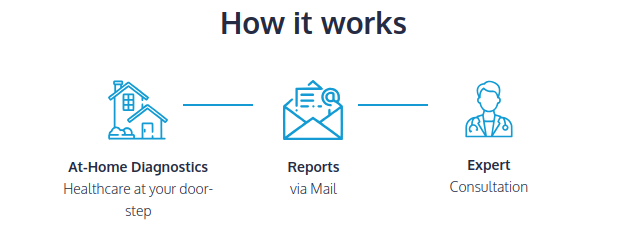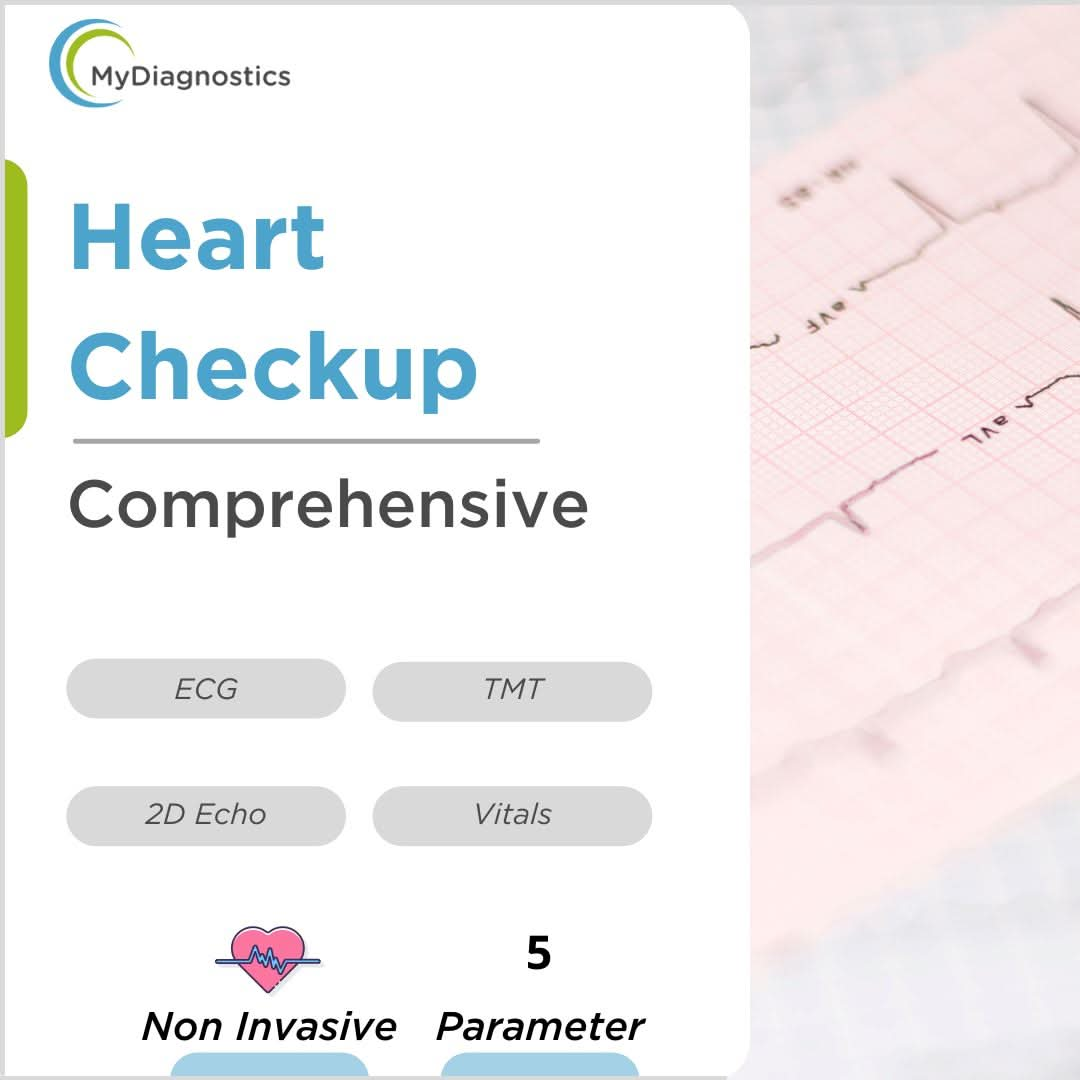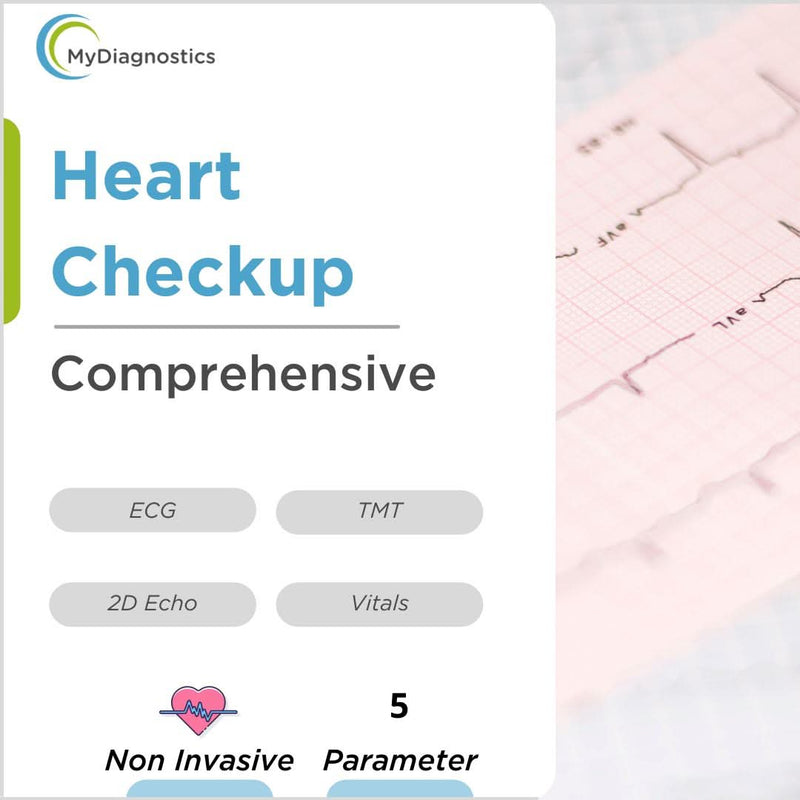Comprehensive Heart Checkup - ECG, TMT & 2D Echo Test - Cardiac Evaluation
Test Parameters

About the Comprehensive Heart Checkup Test
A comprehensive heart checkup, which may include a coronary angiogram also known as a cardiac evaluation or cardiovascular screening, is a series of tests and procedures that use sound waves to create detailed images, or pictures of your heart, to assess the health and function of the heart and blood vessels. The purpose of a comprehensive heart checkup is to identify any potential problems or risks for heart disease, such as the need for cardiac catheterization, and to determine the best course of treatment, if necessary. It also perfectly monitors your blood pressure, sometimes complemented by magnetic resonance imaging mri .
A comprehensive heart checkup typically includes several different tests and procedures, such as:
-
Physical examination: It involves a review of your medical history and a physical exam by a healthcare provider, who will check your blood pressure, pulse, and other vital signs. These examinations also diagnose coronary artery disease. Thus, you can know the condition of the heart and coronary arteries.
-
Blood tests: These tests measure various substances in the blood, such as cholesterol and triglycerides, which can help to identify factors for heart disease.
-
Electrocardiogram (ECG or EKG): This test measures the electrical activity of the heart and can help to detect a wide range of heart conditions and problems
-
2D Echo cardiogram: This test uses sound waves to produce a detailed image of the heart, which can help to assess its size, shape, and function.
-
Stress test (TMT): Tmt test involves walking or running on a treadmill while being monitored by a healthcare provider. It is used to assess how well the heart and blood vessels are functioning during physical activity.
-
Coronary angiography: This test involves injecting a dye into the coronary arteries and using X-rays to produce detailed images of the arteries. It is used to identify any narrowing in the arteries that could cause heart problems.
Please note that the package contains ECG, TMT and 2D Echo test only
Understanding Various Conditions that can impact Heart
There are many different conditions that can affect the heart and its function. Some common heart disease include:
-
Coronary artery disease: This is a condition in which the coronary arteries, which supply blood to the heart, become narrowed or blocked, reducing the amount of oxygen and nutrients the heart receives.
-
Heart failure: This is a condition in which the heart is unable to pump enough blood to meet the body's needs. It can be caused by a various heart disease, including coronary artery disease, high blood pressure, and heart valve problems.
-
Heart attack: A heart attack, also called a myocardial infarction, occurs when blood flow to the heart is blocked, causing damage to the heart muscle. It is a life-threatening condition that requires immediate medical attention.
-
Heart arrhythmias: These are abnormal heart rhythms that can cause the heart to beat too fast, too slow, or irregularly. This heart disease can be caused by a variety of factors, including structural abnormalities in the heart, certain medications, and lifestyle factors.
-
Heart valve problems: The heart has four valves that help to regulate blood through the heart. Problems with these valves, such as stenosis (narrowing) or regurgitation (leaking), can interfere with the heart's ability to pump blood effectively.
-
Heart defects: These are abnormalities in the structure of the heart that are present at birth. They can range from minor defects that do not require treatment to more serious defects that may require surgery.
It is important to diagnose and treat heart conditions as early as possible, particularly those affecting how the heart pumps blood, to prevent complications and improve the chances of a full recovery. If you have symptoms or factors for heart disease, such as heart pain, shortness of breath, or a family history of heart problems, it is important to discuss your concerns with a doctor.
About ECG Test
An electrocardiogram (ECG or EKG) is a test that measures the electrical activity of the heart at resting position. It records the heart's signals as they travel through the heart muscle, and can be used to detect a wide range of heart conditions and problems.
An ECG test is typically done by attaching electrodes to the chest, arms, and legs. The electrodes detect the electrical signals produced by the heart and transmit them to a machine, which records the signals and may also be complemented by high frequency sound waves and cardiac ct to provide further insights. The tracing shows the heart's electrical activity as waves, and healthcare providers can use it to evaluate the heart's rhythm, rate, and other important characteristics.
ECG tests are quick and are considered a non invasive test, and they can be performed in a healthcare provider's office or clinic. They are often used to diagnose or evaluate conditions such as coronary artery disease, heart attacks, arrhythmias, and heart failure. They can also be used to assess the effectiveness of treatments for heart conditions, including a nuclear cardiac test, or to monitor the heart's function after surgery or other procedures.

About TMT (Treadmill Test), Stress Test
A TMT test or treadmill test, also known as a treadmill stress test or exercise stress test, is a type of cardiac test that involves walking or running on a treadmill while being monitored by a healthcare provider. The purpose of a treadmill test is to assess how well your heart vessels are functioning during physical activity.
During a treadmill test, you will be connected to various monitoring devices, such as an electrocardiograph (ECG) machine, to measure your heart rate, blood pressure, and oxygen levels. As you walk or run on the treadmill, the intensity of the exercise will gradually increase, and your healthcare provider will monitor your vital signs and any symptoms you may experience, as well as consider stress echocardiography if needed .
Treadmill tests, which are a form of exercise stress test, are often used to diagnose or evaluate various cardiovascular diseases, such as coronary heart disease, coronary artery disease, heart failure, or arrhythmias. They can also be used to determine an individual's fitness level or assess the effectiveness of treatments for cardiovascular conditions, ensuring overall cardiovascular health .

What is the difference between Treadmill Test (TMT) and ECG
An electrocardiogram (ECG or EKG), which can help identify irregular heartbeats, is a test that measures the electrical activity of the heart at rest, while a TMT test is a type of cardiac test that involves walking or running and monitoring your heart beats. on a treadmill while being monitored by a healthcare provider.
Does heart attack reflects on ECG
An electrocardiogram (ECG or EKG), along with a chest x ray, can often detect signs of a heart attack. It is also called a myocardial infarction, occurs when blood flow to the heart is blocked, causing damage to the heart muscle. During a stroke, the heart may not receive enough oxygen and nutrients, which can cause changes in the heart's electrical activity.
An ECG test or electrocardiogram measures the electrical activity of the heart, and it can often detect these changes, especially if heart surgery is a consideration . For example, a heart attack may cause abnormalities in the electrocardiogram, such as ST segment elevation, which indicates that the heart muscle has been damaged.
About 2D Echo Test
A 2D echocardiogram, also known as a two-dimensional echocardiogram or 2D echo, is a test that uses sound waves to create pictures of your heart. It is a noninvasive nuclear cardiac stress test that does not involve the use of radiation, and it is often used to assess the size, shape, and function of the heart.
During a 2D echo test, a healthcare provider will place a device called a transducer on your chest. The transducer sends out sound waves that bounce off the heart and create echoes, which are then detected by the transducer and transmitted to a machine. The machine uses the echoes to create a detailed image of the heart on a computer screen.
A 2D echo test is typically done to evaluate the heart's structure and function, including the size and thickness of the heart walls, the size and shape of the chambers, and the movement of the valves. It can also be used to assess the blood through the heart and in the identification of any abnormalities or problems, such as heart valve problems, defects, or muscle damage.
It is best to get a complete heart check up, including various heart tests and a TMT test for heart, so that you're able to get a complete overview of your cardiovascular function. You should also get a sense of what is TMT test, and 2D echocardiogram (echo scan), and ECG, so that you're completely aware of all aspects of your heart symptoms.

What are the symptoms of heart disease
It is generally recommended that adults have a comprehensive heart checkup at least once every five years, or more frequently if they have risk for heart disease or a pre-existing heart condition.
The symptoms of heart disease and heart attack can vary depending on the specific condition and the individual. Some common symptoms include, often confirmed through blood tests :
-
Chest pain or discomfort: This may feel like a squeezing, pressure, or heavy feeling in the chest, and it may radiate to the arms, jaw, or back.
-
Shortness of breath: This may occur during physical activity or at rest, and it may be accompanied by fatigue or weakness.
-
Palpitations: These are feelings of rapid, fluttering, or irregular heartbeats that may be accompanied by dizziness or fainting.
-
Swelling in the feet, ankles, or legs: This may be a sign of heart failure, which occurs when the heart is unable to pump enough blood to meet the body's needs.
-
Nausea or vomiting: These symptoms may occur along with chest pain or discomfort and may be a sign of a heart attack.
-
Risk factors for heart disease include high blood pressure, high cholesterol, diabetes, obesity, smoking, and a family history of heart problems. If you have any of these risk factors, or if you have a pre-existing heart condition, it is important to discuss the frequency of heart checkups with your healthcare team to ensure comprehensive care.
When you're looking at ways on how to check heart issues at home, it is best to get a complete analysis done in a clinic. You can find a 2D echo test near me in your area, and get a complete heart blockage test done. You can also learn more about what is echo test and the echo test meaning, to get more details.
What is the meaning of Ischemia
Ischemia is a term that refers to a reduction in blood flow to a particular area of the body, typically due to a narrowing of the blood vessels. Ischemia can occur in any part of the body, but it is most commonly associated with the heart, brain, and legs.
Ischemia can cause a variety of symptoms, depending on the location and severity of the reduced blood flow. For example, ischemia of the heart (also known as myocardial ischemia) can cause chest pain, shortness of breath, and other symptoms, and it can increase the risk of heart attacks. Ischemia of the brain (also known as cerebral ischemia) can cause stroke-like symptoms, such as weakness, numbness, or difficulty speaking or understanding speech. Ischemia of the legs (also known as peripheral artery disease) can cause pain or cramping in the legs when walking or climbing stairs, and it can increase the risk of amputation.
Ischemia is typically treated with medications and lifestyle changes to help improve blood flow and reduce the risk of complications. In some cases, surgery or other procedures may be performed using a special dye to repair damaged blood vessels. It is important to identify and treat ischemia with the help of a healthcare team as early as possible, as a painless test can often assist in this process.





